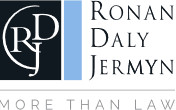David Rodgers: Payment scheme will provide welcome support for employers during coronavirus

David Rodgers
David Rodgers, tax solicitor at Ronan Daly Jermyn (RDJ), explores the support payment scheme announced this week in response to the coronavirus pandemic.
The Revenue Commissioners this week published details of a support payment scheme introduced as part of the response by the Government to COVID-19. The Scheme is administered through the Department of Employment Affairs and Social Protection (DEASP) and aims to provide a special COVID-19 Unemployment Payment of €203 per week to employees who are temporarily laid off due to the ongoing pandemic.
The Scheme operates by providing employers who satisfy the below conditions with the option to make the payment of €203 per week to affected employees through the normal payroll channels, before notifying Revenue through their payroll submissions. Where the employer has satisfied the criteria and applied the payment correctly, they will generally be reimbursed on a “next day” basis by Revenue. The employer should also administer any income tax or USC refunds due to the employee, with these sums also being repaid to the employer through the Scheme.
Scheme Criteria
In order to avail of the Scheme, employers must:
- Have temporarily laid off staff as a result of the impact on their business of the COVID-19 pandemic;
- Keep their staff on payroll and not cease the employee with Revenue;
- Have made a payroll submission in respect of the employee in the period from 1 February 2020 to 15 March 2020; and
- Be unable to make top-up payments over and above the emergency payment of €203 per week.
Operation of the Scheme
The guidance sets out the mechanics to be followed.
The employer or their agent should apply to operate the Scheme through ROS. Once the application is successfully made, the employer should make the payroll submission to Revenue on or before the relevant pay date for their employees. The payroll should be completed with the following details being entered in respect of any relevant employees:
- PRSI Class J9 should be selected;
- A pay amount of €0.01 should be entered as a payment of some form must be made;
- A non-taxable amount of €203 should be entered; and
- The submission should include pay frequency and period number.
The payment of €203 will be made to the employee without deduction of income tax, USC or PRSI. Where an employee is entitled to a refund of income tax, USC or PRSI, this should be repaid to the employee by the employer, who will in turn be refunded the amount by the Revenue Commissioners.
Following the payroll submission, the employer will be credited €203 per relevant employee per week to the employer’s bank account as registered in ROS. In terms of timeline, Revenue advise that the refund for a submission received before 2pm on a given day will be made to the employer on the next banking day.
Restrictions on the Scheme
Employers should be cognisant of the following restrictions when operating the Scheme in respect of any relevant employees:
- No other payments should be made to the employee by the employer in any week where the Scheme is applied. It is critical that employers note that if they make top-up payments to the employee for the period, then the Scheme will not apply.
- The employee must confirm to the employer that they have not and will not claim any additional payment from the DEASP for the period in which the Scheme is applied by the employer.
- Where the employee resumes their ordinary employment with their employer, secures employment elsewhere, or receives any additional support from the Department of Employment Affairs and Social Protection, the employee must not be included in future submissions under the scheme by the employer.
- Employers should advise employees to make an online Jobseeker’s Benefit claim (in order for the employee to access qualified dependant payments as appropriate). Employers should note that this appears at odds with the condition that an employee cannot receive additional payments from DEASP in order to avail of the Scheme, yet employers should still advise their employees to apply for Jobseeker’s Benefit for qualified dependants.
Additional Measures
Wednesday’s announcement of the Scheme follows previous guidance issued by the Revenue Commissioners to business owners, highlighting the willingness of Revenue to engage with any viable businesses which experience temporary cashflow difficulties, including those arising from COVID-19. While all businesses should still file their tax returns on time, this option for early engagement should be availed of where an employer is concerned that their good tax compliance record may be jeopardised. One resource available to employers in this regard is Revenue’s Online Phased Payment Facility, through which a Phased Payment Arrangement may be applied for. Successful applicants should be afforded flexibility by Revenue in managing their tax payments in conjunction with the needs of their businesses and any cashflow challenges.
Separately, Revenue have announced that the Local Property Tax payment date of 21 March, 2020 for the Annual Debit Instruction or a Single Debit Authority payment has been amended to 21 May, 2020.
Conclusion
The Scheme should be welcomed as a necessary first step by the Government in providing support for employers during a time of deep economic uncertainty. Whether these measures, together with those previously announced, will afford sufficient protection to employers and employees alike remains to be seen.
For the present, employers should consider the applicability of the scheme to their workforce and ensure that their payroll systems are prepared to administer the scheme should the necessity arise.

- David Rodgers is a solicitor in the tax department at Ronan Daly Jermyn.










